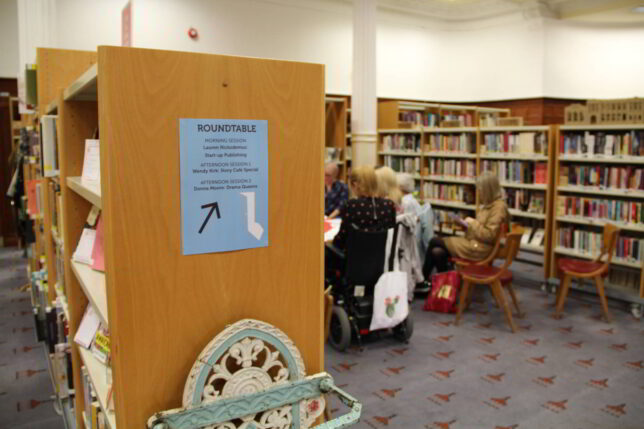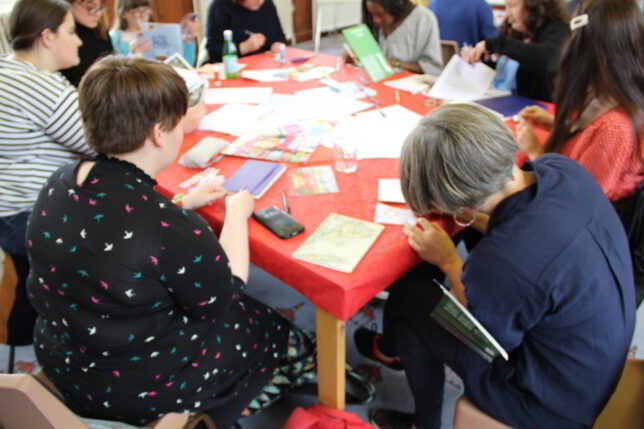What an inspiration and a delight it was to attend the daytime session of GWL’s Literary Festival, Open the Door, on Saturday 18th May. This festival has a unique identity, merging the interests and aspirations of readers and writers within a feminist context.
My day began with participation in a round-table discussion and interrogation of the PEN International Women’s Manifesto of 2017. The session was facilitated by Elizabeth Reeder of Scottish PEN, who encouraged us to consider the reasons for establishing the manifesto and how we might wish to shape its evolution. We scrutinised its constituent principles and discussed our responses to them. We acknowledged how these principles interlink but agreed that some need to be further nuanced to reflect how levels of privilege interact to marginalise many women. Group members felt that the value of women should also be made more explicit.
More about the manifesto and some responses to its principles can be found on the PEN International website.
The second session I attended was delivered in the form of an interview with novelist Kerry Hudson. She referred to her previous semi-autobiographical novels but specifically spoke about writing her latest book – a memoir. Lowborn: Growing Up, Getting Away and Returning to Britain’s Poorest Towns is the deeply personal story of Kerry’s troubled childhood, characterised by grinding poverty and constant family upheaval. She felt compelled to write about her lived experiences as an antidote to those writing about her own community from a position of little knowledge or authenticity. However, this brought challenges. She told us of her early lack of confidence in her writing. As a working class woman, she had doubts about whether she had anything valuable to say. It was winning a writing competition which helped her to break through this self-doubt to write a book which is now considered to be of national significance.
Later challenges involved soul-searching about who might be offended by telling her story, specifically by subjects largely considered to be taboo. Around our table this promoted a powerful discussion of dilemmas faced by the memoir writer when sharing personal details and recollections. Kerry’s message was that our personal stories are best told from a post-anger point-of-view to help avoid causing offence to others. In fact, she had felt overwhelmed by the support she received following the publication of Lowborn, particularly from those who could identify with elements of her story and felt it was their story too.
Her account of overcoming the constraints of her childhood and the barriers she faced as a writer was warmly receive d by many of the emerging writers present. We were inspired by her achievements and encouraged by her advice. This was a call to courage for women to believe in and write their own stories.
Read more about Lowborn on the Penguin website.
Lunchtime brought the opportunity to chat and hear about other workshops. Two of my lunch companions had attended Lesley McDowell’s interview with author Helen Fitzgerald who had spoken about the challenges facing female writers in adapting their work for the screen. They had been shocked to hear about the nepotism and protectionism within the film industry and had learnt of a male-dominated environment in which only a few screenwriters prevail; an environment which is resistant to change. Another lunch-buddy had enjoyed the discussion led by writer and singer-songwriter, Linda Jackson, about women’s access to education and the importance of gender equality within the curriculum. Helen also publishes the works of others through her small publishing company and is passionate about challenging the traditionally male literary canon.
The two workshops I attended in the afternoon addressed more directly my curiosity and needs as a writer. I was put to work! Lesley McDowell helped us grasp how historical fiction is guided by character and how to balance the presence and absence of historical detail in telling a story. Through close reading and by inviting us to compare three pairs of extracts from well-known historical novels, Lesley demonstrated various techniques to support historical fiction writing. We covered the use of symbolism; the advantages/disadvantages of creating fictional historical characters as opposed to writing about known historical figures and how the development of character has to cut through historical detail. This workshop was a real fusion of the needs of the writer and the reader. In my own writing, I have tended to avoid historical subjects. I have suspected there to be an etiquette around this genre and maybe the requirement of a special set of research skills. The workshop demystified this and gave me an appetite to engage more creatively and boldly with historical characters in future.
Where Lesley’s workshop was all about the fictional portrayal of others, Catherine Simpson’s session focussed on writing about ourselves. Her debut novel, Truestory , was inspired by her experiences of raising an autistic daughter. Her recently published and critically acclaimed memoir, When I Had a Little Sister, tells of the loss of her younger sister to mental ill-health and eventually, to suicide. Catherine spoke about her initial resistance to writing about her sister but how eventually she felt compelled to do so. She also spoke, like Kerry Hudson, of the challenges of writing about such a personal subject and the contract built with the reader, a contract of trust to tell the truth as the writer experiences it. We were invited to reflect upon stories we might find challenging to share with others and why. Then, through a series of prompts we wrote about ourselves and our memories. It was optional to read our pieces to the group but it was exciting to listen to the literary jewels we had all created within a short timescale. One participant disclosed that, although she had been writing for some time, this was the first occasion on which she had ever shared any written work. We found her courage inspiring and I hope she will choose to share her words with others again soon.
There was practical writing advice, too. Here are some of Catherine’s top tips for memoir writing:
- write a first draft without thinking too much – to allow it to flow like a conversation, a spoken story
- to help build characters, start with their beliefs
- leave the first draft for a week before returning to it
- if you want to write memoir, read memoir (Catherine recommends Nigel Slater’s Toast)
This session was very helpful and practical. On the bus home later in the day, I was inspired to take out my phone and order When I Had a Little Sister, which I have since read and can thoroughly recommend.
As I journeyed homeward I reflected on my first encounter with Open the Door. Not only had my curiosity as a reader been stimulated through the generous contributions of those leading workshops but I was taking away new insights to inform my own writing. It had been a day of conversations, challenges, insights and laughter. Best of all, this had all been delivered in the affirmative, supportive and creative environment which awaits all who cross the threshold at Glasgow Women’s Library. Congratulations to all who contributed to the success of a wonderful day and a brilliant festival.



Comments are closed.